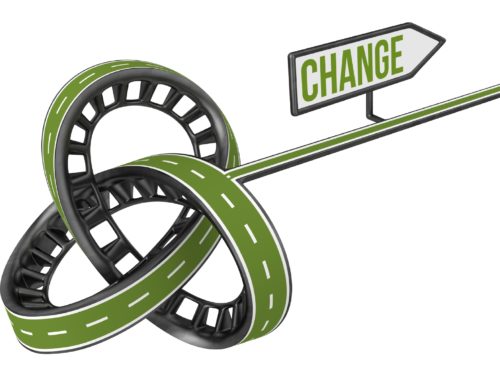Your work as a leader – where you invest your energy and resources – must evolve and grow to ensure continued success in a world defined by uncertainty, upheaval, and change.
This isn’t about your role, responsibility, or leadership style.
The role and responsibility remain constant regardless of environment or circumstances: Influence the actions, outcomes, trust, and relationships of others to deliver positive results.
Likewise, there are styles that work best in certain situations, but that doesn’t ensure that you are doing the necessary work.
Where leaders traditionally work
Leaders, we’ve been told, work in two primary areas: In the business and on the business.
You are, no doubt, spending more time working “in the business” today. Keeping the team focused, customers happy, and new sales cultivated is crucial.
The sense of immediacy and accomplishment can also be habit forming. Unfortunately, working exclusively in the business limits your and your organization’s potential. The best you can reasonably expect is maintaining the status quo with only incremental improvements.
Opportunities for growth and transformation appear when you consciously add working on the business. The organizations that will lead the future are being developed and nurtured today. Don’t miss this opportunity to rethink your strategy, reimagine and refine processes, align the org chart, and create focus.
The new areas where leaders work
Regrettably, dedicated work in and on your business won’t be enough. Building an organization or team that can flourish in a world of uncertainty and upheaval requires intentional work in four specific areas:
- Work on the culture: Peter Drucker is credited with saying, “Culture eats strategy for breakfast.”
In today’s environment, culture eats everything for breakfast.
Having people feel good about their treatment are essential parts of the culture. You can’t, however, allow your culture to be limited to that view.
Keeping promises to customers, delivering great service, and being accountable are important aspects, too. Leaders must work to ensure that the values and platitudes that appear on websites, coffee mugs, and posters come to life in every aspect of their culture.
- Work on the team and talent: Your organization’s ceiling in every area of performance and behavior is determined by the capacity and capability of your team.
You don’t have to get rid of everyone and overpay for talent. You do need to consciously recruit, develop, and retain the team and talent that can carry you where you want to be.
Building a championship-level athletic team usually takes time to assemble the pieces, provide the experience, create the cohesiveness, and develop the competencies to win it all. It’s the same for your team. Now is the time to assess your team, develop those with the potential to perform at a higher level, and recruit the additional talent you need.
- Work on the relationships: Normally you might include this as part of working on your team and talent. Nothing feels normal about what we are experiencing today.
Your team is facing a triple threat: uncertainty about the impact of the COVID-19 virus and adapting to new ways of working; economic upheaval; and societal turmoil from raw feelings about racial injustice.
Every member of your team needs a stronger personal relationship with you. They also need safe opportunities to strengthen relationships with each other.
Upheaval and uncertainty create stress, and unproductive stress destroys relationships. Your team needs to trust you and trust each other now more than ever.
- Work on yourself: All leadership begins with self-leadership. Your team and organization will never meet the challenges of the future unless you are more effective as a leader.
Take an honest look at your capability and capacity to help your team succeed both now and in the future. Then take positive action to get better at areas where that need improvement and leverage those that are strengths.
Most important, take care of yourself and manage your personal stress. You are useless to your team if you are bringing less than your absolute best to your job every day.
The ceiling for your team’s performance largely depends on the limits of the leader’s commitment, capacity, and competence. You can’t raise that ceiling until you are willing to do the work.
Randy Pennington is an award-winning author, speaker, and leading authority on helping organizations achieve positive results in a world of accelerating change and uncertainty. To bring Randy to your organization or event, visit www.penningtongroup.com , email info@penningtongroup.com, or call 972.980.9857.





